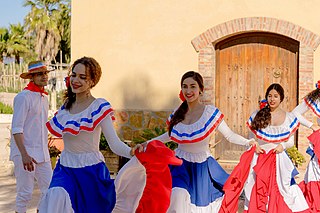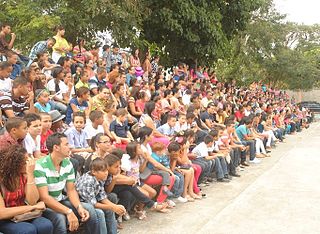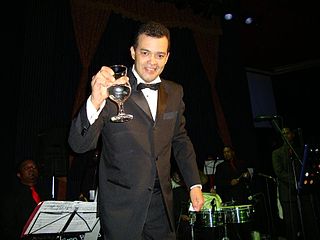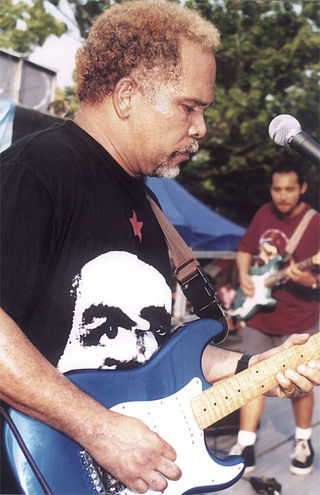
The music of the Dominican Republic is primarily influenced by Western European music, with Sub-Saharan African and native Taino influences. The Dominican Republic is mainly known for its merengue and bachata music, both of which are the most famous styles of music in the Dominican Republic, and have been exported and popularized around the world.

The Music of Puerto Rico has evolved as a heterogeneous and dynamic product of diverse cultural resources. The most conspicuous musical sources of Puerto Rico have primarily included African, Taino Indigenous, and European influences. Puerto Rican music culture today comprises a wide and rich variety of genres, ranging from essentially native genres such as bomba, jíbaro, seis, danza, and plena to more recent hybrid genres such as salsa, Latin trap and reggaeton. Broadly conceived, the realm of "Puerto Rican music" should naturally comprise the music culture of the millions of people of Puerto Rican descent who have lived in the United States, especially in New York City. Their music, from salsa to the boleros of Rafael Hernández, cannot be separated from the music culture of Puerto Rico itself.

Juan Luis Guerra Seijas is a Dominican musician, singer, composer, and record producer. Throughout his career, he has won numerous awards including 24 Latin Grammy Awards, three Grammy Awards, and one Latin Billboard Music Award. He won 3 Latin Grammy Awards in 2010, including Album of the Year. In 2012, he won the Latin Grammy Award for Producer of the Year. He has sold 15 million records worldwide, making him one of the best-selling Latin music artists.

Merengue is a type of music and dance originating in present day Dominican Republic which has become a very popular genre throughout Latin America, and also in several major cities in the United States with Latino communities. Merengue was inscribed on November 30, 2016 in the representative list of the Intangible Cultural Heritage of Humanity of UNESCO.

Bachata is a genre of music that originated in the Dominican Republic in the 20th century. It contains elements of European, indigenous Taino and African musical elements, representing the cultural diversity of the Dominican population.

The culture of the Dominican Republic is a diverse mixture of different influences from around the world. The Dominican people and their customs have origins consisting predominantly in a European cultural basis, with native Taíno and African influences.
Monchy & Alexandra were a bachata musical group from the Dominican Republic. They sang together as a duo beginning in 1998. Their first big hit was "Hoja en Blanco (song)", which they released in 1999. Since then, they had many other hits, such as "Hasta El Fin" and "Perdidos", both from their 2004 album Hasta el Fin, as well as "No Es Una Novela" from their 2006 Éxitos y Más album. They have been often credited with being instrumental in popularizing bachata music outside of the Dominican Republic.

Merengue típico is a musical genre of the Dominican Republic, and the oldest style of merengue. Merengue típico is the term preferred by most musicians as it is more respectful and emphasizes the music's traditional nature. The Instruments that are used are the accordion, bass guitar, güira, conga, and tambora (drum).

Raulín Marte Rodríguez is a Dominican bachata artist. He is one of the first major bachata artists to have international success. As a pioneer of the bachata genre, he helped grow the genre's popularity in the 1990s. While traditional bachata songs were often risque and suggestive, Raulín Rodríguez's idealized romantic lyrics widened the appeal of the genre of bachata, helping it get regular radio play. Rodriguez is known as "El Cacique" and is one of the most established musicians to ever come from the Dominican Republic. He has many international hits, including the songs: "Nereyda", "Medicina de Amor", "Soledad", Esta Noche, and many more. Three of them have been certified Platinum in the United States by the Recording Industry Association of America (RIAA).

Alex Bueno, originally born as Alejandro Wigberto Bueno López, is a singer and guitarist from the Dominican Republic, specializing in merengue and bachata music, but also having ties in salsa, bolero, merengue típico, ballad and more. He broke out onto the scene in his early life and has been on the Dominican music scene for over 40 years. Having been an artist for so long, he has amassed a large fanbase in the Dominican Republic.
Bachatón is a fusion genre of reggaeton from Panama and Puerto Rico as well as bachata from the Dominican Republic. Bachaton combines bachata melodies and reggaeton style beats, lyrics, rapping, and disc jockeying. The word "bachatón" is a portmanteau of "bachata" and "reggaeton". "Bachatón" was coined and widely accepted in 2005. It is a subgenre of reggaeton and bachata.
Yoskar "El Prabu" Sarante was a prominent Dominican bachata singer.
Eladio Romero Santos was a Dominican musician. Originally from Cenoví, a town outside of San Francisco de Macorís, Santos' career spans over forty years. Santos started recording bachata in 1966 with his first song "Tomando En Tu Mesa". Since he performed mostly in country social clubs and for patron saints' festivals, he was not marginalized as were many of his fellow bachateros. Santos' style was much simpler and more straightforward than that of other guitarists such as Edilio Paredes; it was also rhythmic and danceable. He contracted arthritis in 1995 and was forced to stop playing the guitar. After 1995, he only performed as a singer. Romero Santos retired in 1998. He died three years later, in 2001, of lung cancer. his sister Leonilda Alejo moved to the United States and made some very popular songs such as Mamita and sera porque soy pobre. she currently now lives in the United states and has quit her music career.

Lenny Santos a.k.a. Len Melody is an American guitarist, composer, producer and entrepreneur. He rose to global fame as the co-founder of the bachata group Aventura where he served as producer, lead guitarist, vocalist, composer and musical director. Lenny is responsible for the group's distinctive sound. He is the one who dared to experiment with bachata, adding fusions of R&B, hip hop and pop. He added electric guitars and effects like tremolo, phaser and wah. Lenny is considered the pioneer and creator of urban bachata, and is one of the most sought out music producers in the Latin music industry to this day. Aside from being a musician and producer, he owns multiple businesses such as restaurants and lounges in the New York City area.

Daniel Santacruz is a Dominican singer, songwriter, and music producer. Born in New Jersey and raised in the Dominican Republic to a Cuban father and a Dominican mother, Santacruz is a Latin Grammy Award winner.

Fogaraté! is the seventh album of the famous Dominican songwriter and musician Juan Luis Guerra. It was released on July 19, 1994. The album mixed a variety of music genres including rural and flolklroic rots of merengue called "Perico Ripao" with elements of African soukus music and Tropical Music such as Reggae with the collaboration of African guitarist Diblo Dibala and Dominican accordionist Francisco Ulloa, along with Son, Bachata and Salsa. Also, the album features a particular, bachata-styled adaptation of the Lacrimosa movement from Mozart's Requiem Mass in D Minor and Guerra's first song fully in English "July 19". Exploring lyrics and themes about magical realism of Latin American literature and commenting on the politics of the Caribbean, for many fans and critics, Fogaraté! is one of his most musically complex album.
While the Dominican Republic is known for shaping merengue and bachata music, its musicians have also melded these influences into the early development of salsa music amongst the Latin community of New York City in the early 1960s. A major development in those initial days of salsa occurred when Johnny Pacheco, a Dominican-born musician living in New York City, teamed with partner Jerry Masucci to create Fania Records in 1964. They started selling records from the trunk of cars on the streets of Spanish Harlem, signing up young artists, creating new sounds, and eventually having hit records. Over the next 15 years, Fania Records helped define the sound, culture, and language associated with the salsa genre, a musical movement that arose partly from the unavailability in the United States of music produced in Cuba.

Luis Díaz Portorreal, best known as Luis Días, was a musician, composer and performer of popular music born in the Dominican Republic.
Joan Soriano is a Dominican bachata singer and guitarist from the Dominican Republic. His style is a blend of modern with traditional bachata. Since the 1980s, Joan's guitar and arrangements have graced many hit bachatas by other artists, and since 2008, he has begun to make a name for himself internationally.

"Bachata Rosa" is a song by Dominican Republic singer-songwriter Juan Luis Guerra released in 1991 and served as the lead seventh and final from his fifth studio album Bachata Rosa (1990). Along with Estrellitas y Duendes and Como Abeja Al Panal, is one of Guerra's first international hits and helped to contribute to the bachata sophistication and have recognition in Latin America and Europe. The track was a commercial success, toping the airplay charts in Mexico and was the fourth single of the album to peak insade of the top 10 at the US Hot Latin Tracks.














